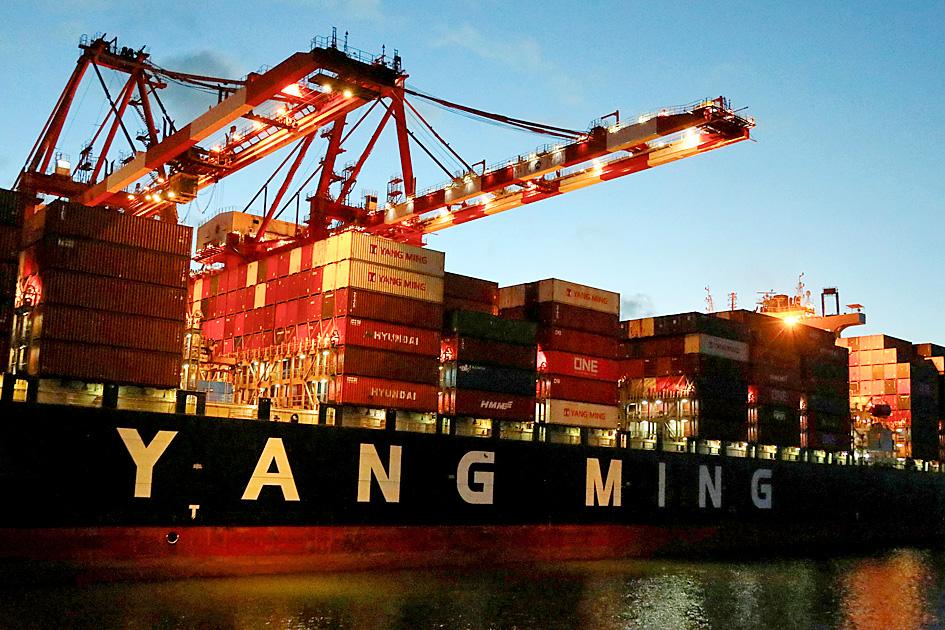Exports last month surged 8.3 percent year-on-year to a record US$31.17 billion, driven by seasonal demand for electronics and frontloading by China’s Huawei Technologies Co (華為) ahead of sales bans, the Ministry of Finance said yesterday.
The ministry painted the data as “surprisingly strong” and said it expects outbound shipments to expand by another 1.5 to 4.5 percent this month due to more working days and continued demand for electronic components.
“The [latest] trade data suggest that exports have stabilized, thanks to 5G deployment and distance businesses, as countries opened up their economy,” Department of Statistics Director-General Beatrice Tsai (蔡美娜) told a news conference in Taipei.

Photo: Ann Wang, Reuters
It is the first time exports surpassed US$30 billion, with electronic parts accounting for 40 percent at US$12.48 billion, up 19.1 percent from a year earlier, Tsai said.
Taiwan is a key global supplier of chips and other components used in smartphones, laptops, TVs and other consumer electronic gadgets.
Shipments to China soared 22.9 percent to US$14.46 billion, while those to the US jumped 13.8 percent to US$4.65 billion, both record numbers, Tsai said.
Meanwhile, declines in exports to Europe, Japan and ASEAN markets narrowed to single percentage points, despite the COVID-19 pandemic, the ministry’s monthly report said.
Frontloading by Huawei supplied the tailwind, Tsai said, putting the effect at between US$1.5 billion and US$2 billion.
The Chinese technology titan has aggressively built up inventory for its smartphones and 5G equipment because it would no longer be able to access US technology and equipment, directly or indirectly, from Tuesday next week.
Demand was strong for semiconductors, passive components, flat panels and wireless network devices, the ministry said.
Retreats in exports of non-tech products wound down except for mineral products, which plunged 56 percent from a year earlier as demand for travel by land, sea and air remained sluggish, Tsai said.
Oil prices tumbled 30.5 percent to US$45.2 a barrel last month, the ministry said.
Imports also gained momentum, with an 8.5 percent increase to US$24.71 billion, allowing Taiwan to register a trade surplus of US$6.47 billion, up 7.6 percent from a year earlier, it said.
Imports of capital equipment rose 19.3 percent as local semiconductor firms expand and upgrade their manufacturing facilities to stay competitive and meet customer needs, it said.
For the first eight months of the year, exports increased 1.5 percent to US$217.38 billion, while imports edged down 0.1 percent to US$184.2 billion, it said.
Trade data so far this quarter show a good chance of beating the Directorate-General of Budget, Accounting and Statistics’ forecast of a contraction, Tsai said.

The US dollar was trading at NT$29.7 at 10am today on the Taipei Foreign Exchange, as the New Taiwan dollar gained NT$1.364 from the previous close last week. The NT dollar continued to rise today, after surging 3.07 percent on Friday. After opening at NT$30.91, the NT dollar gained more than NT$1 in just 15 minutes, briefly passing the NT$30 mark. Before the US Department of the Treasury's semi-annual currency report came out, expectations that the NT dollar would keep rising were already building. The NT dollar on Friday closed at NT$31.064, up by NT$0.953 — a 3.07 percent single-day gain. Today,

‘SHORT TERM’: The local currency would likely remain strong in the near term, driven by anticipated US trade pressure, capital inflows and expectations of a US Fed rate cut The US dollar is expected to fall below NT$30 in the near term, as traders anticipate increased pressure from Washington for Taiwan to allow the New Taiwan dollar to appreciate, Cathay United Bank (國泰世華銀行) chief economist Lin Chi-chao (林啟超) said. Following a sharp drop in the greenback against the NT dollar on Friday, Lin told the Central News Agency that the local currency is likely to remain strong in the short term, driven in part by market psychology surrounding anticipated US policy pressure. On Friday, the US dollar fell NT$0.953, or 3.07 percent, closing at NT$31.064 — its lowest level since Jan.

Hong Kong authorities ramped up sales of the local dollar as the greenback’s slide threatened the foreign-exchange peg. The Hong Kong Monetary Authority (HKMA) sold a record HK$60.5 billion (US$7.8 billion) of the city’s currency, according to an alert sent on its Bloomberg page yesterday in Asia, after it tested the upper end of its trading band. That added to the HK$56.1 billion of sales versus the greenback since Friday. The rapid intervention signals efforts from the city’s authorities to limit the local currency’s moves within its HK$7.75 to HK$7.85 per US dollar trading band. Heavy sales of the local dollar by

The Financial Supervisory Commission (FSC) yesterday met with some of the nation’s largest insurance companies as a skyrocketing New Taiwan dollar piles pressure on their hundreds of billions of dollars in US bond investments. The commission has asked some life insurance firms, among the biggest Asian holders of US debt, to discuss how the rapidly strengthening NT dollar has impacted their operations, people familiar with the matter said. The meeting took place as the NT dollar jumped as much as 5 percent yesterday, its biggest intraday gain in more than three decades. The local currency surged as exporters rushed to